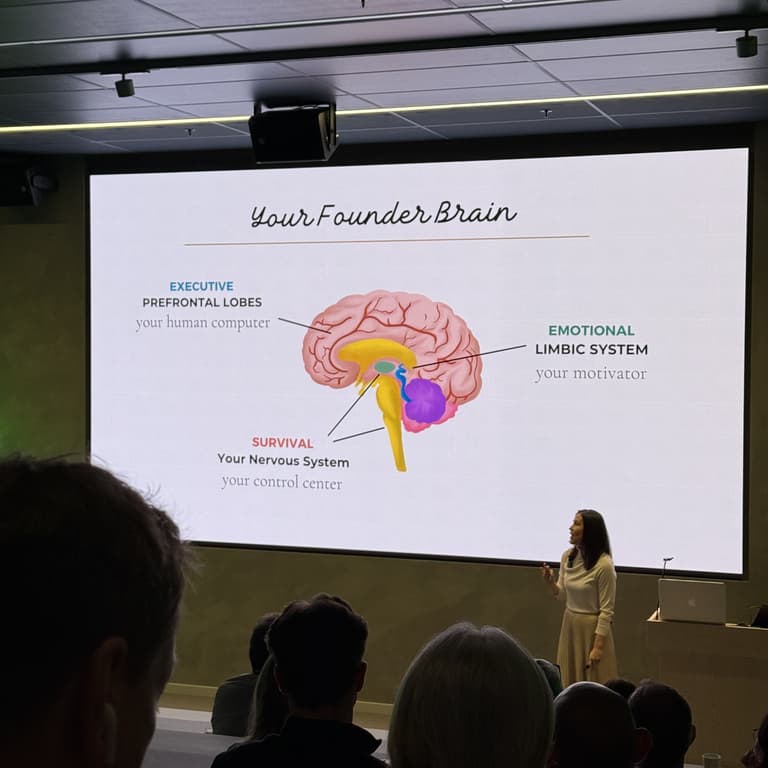RunwayFBU's Takeoff Tuesday in March provided invaluable insights into building resilience for founders and leaders.
The session featured a fireside chat between Kari Elizabeth Enge , a neuroscience expert and CEO of Do Better Business School, and Matts Johansen, the CEO of Aker BioMarine, who recently participated in a grueling 1000km dog sled race across Alaska in -50°C weather.

The discussion centered around the intersection of neuroscience, resilience, and achieving success in both personal and professional life, drawing on Kari's expertise in nervous system regulation and Matts' firsthand accounts of pushing his limits in extreme conditions.
Here are some key takeaways from their conversation:
- Nervous System Regulation is Fundamental for Success: Kari emphasized that understanding how our nervous system works is crucial for reaching goals with more impact and ease. She explained the three parts of the brain (executive center, emotional center, and survival center/nervous system) and how the nervous system's perception of safety or threat significantly impacts cognitive function, emotions, and overall performance.

- The Window of Tolerance and Strategic Disregulation through Extreme Experience: Kari introduced the concept of the "Window of Tolerance" and the "stretch zone" (Goldilocks zone) as the optimal place for building resilience. She cautioned against pushing too far outside the comfort zone too quickly without the right mental tools, as it can lead to traumatic stress. Matts Johansen's experiences with extreme races, like the recent 1000km race and a previous challenging 650km race in Norway, illustrate a form of intentional pushing of boundaries that led to what he calls "post-traumatic growth". Kari acknowledged this, sharing that there are tools to create mental and emotional safety with dysregulation" by first believing that challenges build strength.

Listen to Matt's Alaskan adventure here.
- Mindset and Focus on Growth: Both speakers highlighted the importance of mindset. Matts shared how the belief that hardship would make him stronger helped him through challenging races, recalling advice from an experienced dog musher. Kari emphasized making personal growth the central point, viewing business as a playground for self-development. Matts also stressed the importance of focusing on successes rather than dwelling on mistakes to foster a safe environment for innovation and risk-taking.
- Resilience is Built Through Facing Challenges: Matts' accounts of enduring extreme sleep deprivation and hallucinations during his dog sled races underscore the idea that resilience is built by confronting and overcoming significant challenges. He noted that his difficult past experiences made subsequent challenges feel easier, demonstrating an increased capacity.

- Unconscious Competence in High Performers: Matts admitted to being "unconscious" about the nervous system regulation tools Kari discussed. Yet, his experiences and mindset naturally align with many of these principles, such as his drive for freedom and his approach to risk-taking and problem-solving in business, including navigating a significant market downturn. This suggests that high-performing individuals often develop innate mindsets and perspectives that manage stress and build resilience, even without explicit knowledge of the underlying neuroscience.
- The Role of Omega-3s in Brain Health: As CEO of Aker BioMarine, Matts discussed the critical role of omega-3 fatty acids in brain cell function, particularly in regulating inflammation, which can impact mental health and cognitive function. He highlighted Aker BioMarine's research in this area and the US military's interest in omega-3 supplementation for soldiers to enhance resilience.
- Learning from Extreme Experiences: Matts emphasized that going through hardships, both in extreme sports and in business, builds a unique kind of strength and preparedness for future challenges. He shared an example of navigating a significant stock drop after a regulatory change, relying on his team and a plan to recover.
In essence, the fireside chat provided a compelling look at how extreme personal challenges, like Matts Johansen's dog sled racing, can offer profound lessons in resilience and mental fortitude that are directly relevant to the pressures of leadership and business.
Kari's insights from neuroscience provided a framework for understanding these experiences, highlighting the importance of nervous system regulation and mindset tools, and even physiological factors like omega-3 intake in our capacity to thrive under pressure and achieve sustainable success.
Every last Tuesday of each month, RunwayFBU hosts these insightful Takeoff Tuesday sessions with the goal of empowering founders and leaders with the knowledge and perspectives needed to build better companies and navigate the complexities of their journeys. This month's discussion, featuring the contrasting yet complementary experiences of a neuroscience expert and a resilient business leader and extreme athlete, offered valuable lessons on understanding our own capacity for growth, strategically engaging with challenges, and prioritizing both mental and physiological well-being for sustained success. These sessions serve as a vital platform for the RunwayFBU community to learn from diverse experiences and cutting-edge insights, fostering a culture of continuous development and resilience within the startup ecosystem.
Join the next Takeoff Tuesday at RunwayFBU, and our other events by visiting lu.ma/RunwayFBU



